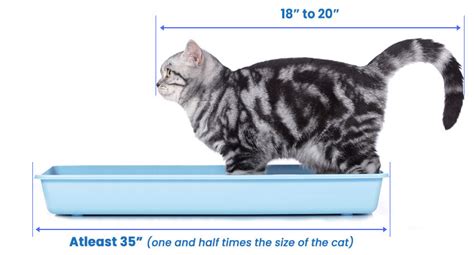Introduction

In the feline world, the litter box is a sacred space – a haven for privacy and relief. But with the plethora of litter box options available in 2023, choosing the right one can be a daunting task. One of the most important considerations is the size and shape of the litter box, which can have a significant impact on your cat’s comfort and well-being.
Litter Box Sizes: The Ultimate Guide
The size of a litter box is crucial for providing your cat with ample space to move around and eliminate, without feeling cramped or restricted. Generally, the length of a litter box should be 1.5 times the length of your cat, and the width should be 1.25 times the width of your cat. But remember, these are just general guidelines, and you may need to adjust the size depending on your cat’s individual needs.
Small Litter Boxes (Under 18 inches)
Small litter boxes are ideal for kittens, small adult cats, and cats who are limited in space, such as those living in apartments or small homes. These boxes are typically 14 to 18 inches in length and 10 to 14 inches in width. However, it’s important to note that some cats may find small litter boxes too confining, leading to discomfort and potential elimination issues.
Medium Litter Boxes (18-24 inches)
Medium litter boxes are suitable for most adult cats and provide a comfortable amount of space for them to move around and eliminate. These boxes range in size from 18 to 24 inches in length and 14 to 18 inches in width. They are a good choice for cats who are not particularly large or small and have no space limitations.
Large Litter Boxes (24 inches and Above)
Large litter boxes are designed for large cats, multiple cats, or cats with mobility issues. These boxes are typically 24 inches or more in length and 18 inches or more in width. They provide ample space for cats to move around freely and eliminate comfortably, even if they are large or have health conditions that affect their mobility.
Litter Box Shapes: A Matter of Personal Purr-ference
In addition to size, the shape of a litter box can also impact your cat’s comfort. Here are the different shapes available and their respective advantages:
Rectangular Litter Boxes
Rectangular litter boxes are the most common and economical option. They are simple to use, easy to clean, and can fit in most spaces. However, some cats may find the corners of rectangular litter boxes uncomfortable, especially if they have sensitive paws or mobility issues.
Round Litter Boxes
Round litter boxes provide a more natural shape for cats, as they resemble the shape of a cat’s natural elimination area. These boxes are often preferred by cats who are prone to litter box avoidance or who have anxiety issues. Additionally, round litter boxes are easy to clean and can fit in small spaces.
Hooded Litter Boxes
Hooded litter boxes offer privacy and reduce odor, which can be beneficial for cats who are shy or have a strong sense of smell. However, hooded litter boxes can be more difficult to clean and may not be suitable for cats who are large or have mobility issues.
Pros and Cons of Different Litter Box Sizes and Shapes
| Size/Shape | Pros | Cons |
|---|---|---|
| Small Litter Boxes | Suitable for kittens, small cats, and space-limited homes | May be too confining for some cats |
| Medium Litter Boxes | Ideal for most adult cats | May not be large enough for large cats or multiple cats |
| Large Litter Boxes | Provide ample space for large cats, multiple cats, and cats with mobility issues | Can be bulky and difficult to clean |
| Rectangular Litter Boxes | Common, economical, easy to clean | Corners may be uncomfortable for some cats |
| Round Litter Boxes | Natural shape, preferred by cats with anxiety | Can be difficult to clean |
| Hooded Litter Boxes | Provide privacy and reduce odor | More difficult to clean and may not suit large cats |
How to Choose the Right Litter Box Size and Shape for Your Cat
Selecting the right litter box size and shape for your cat is crucial for their comfort and well-being. Consider the following factors:
- Size: Measure the length and width of your cat to determine the appropriate size of litter box. If you have multiple cats, choose a box that is large enough to accommodate all of them comfortably.
- Shape: Observe your cat’s behavior and preferences to determine if they prefer a rectangular, round, or hooded litter box. Consider their size, health, and temperament to make the best choice.
- Space: Consider the available space in your home and choose a litter box that fits comfortably without being too bulky or intrusive.
Conclusion
The perfect litter box size and shape for your cat is one that provides them with ample space, comfort, and privacy while fitting your home environment. By understanding the different options available and considering your cat’s individual needs, you can choose the best litter box to ensure their happiness and well-being for years to come.





















